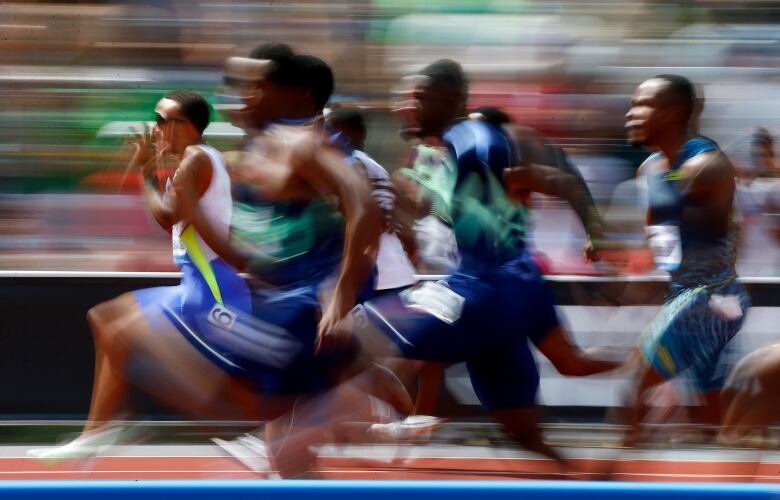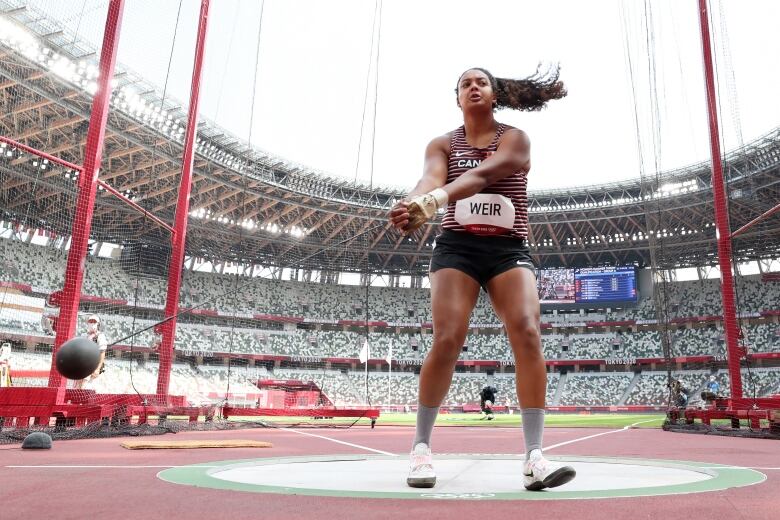Canadian ‘Ducks’ have flocked to the heart of track and field | CBC Sports
It is surprising that given the record compiled by American track and field athletes over the course of world summits and the Olympics, that Eugene 2022 marks the first time in the history of the World Athletics Championships that the biggest meet of all will be staged in the United States.
“There’s no question that Eugene is known around the world as a major, if not the major centre of the sport,” two-time Olympian Doug Clement says from his home in Vancouver.
Clement, originally from Montreal, competed at the Games in Helsinki in 1952 and in Melbourne in 1956, and ran as a sprinter for the University of Oregon Ducks in Eugene from 1951 to 1955.
He is just one of an illustrious group of athletes who hailed from Canada and were drawn to this smallish city in the Pacific Northwest at the southern end of the Willamette Valley, to become part of a worldwide athletic tradition.
“There was massive coverage in the local newspaper, the Eugene Register Guard, and for every meet there was a form chart of what athletes were likely to do,” Clement says.
“You became visible in the community as being part of the fraternity of track and field athletes and we had a winning tradition.”
The tradition in Eugene began at the turn of the 20th century when Bill Hayward, a world lacrosse champion with the Ottawa Capitals who grew up in Toronto, became the first track and field coach for the University of Oregon Ducks in 1904.
Hayward, who was nicknamed “The Colonel” because of his gruff and demanding style, built the program at Oregon into a powerhouse over his 44 years at the helm and coached the American athletics team at the Olympics from Stockholm in 1912 to Berlin in 1936.
‘Western centre of the sport’
The historic stadium in Eugene, which has been totally rebuilt for these championships, still bears his name and is a testament to the prestige that the sport holds in this part of the world.
“Eugene has been the heart of track and field in North America all along right from the beginning of Bill Hayward’s time there,” Clement says. “Any athlete around the world recognizes Eugene as the American centre, the North American centre, the western centre of the sport.”

The legendary Bill Bowerman took over from Hayward as coach after World War II and in a quarter of a century as the Ducks leader produced 24 NCAA individual titles and four team victories, while guiding 33 Olympians who were attracted to compete at Oregon from around the world.
Bowerman also co-founded the athletic shoe giant Nike with Phil Knight, another Oregon alumnus, and transformed Eugene into what has become known as “TrackTown USA”
During his tenure Bowerman coached Canadians like sprinter Harry Jerome of Prince Albert, Saskatchewan who would go on to win a bronze medal in the 100 metres at the Tokyo Olympics in 1964 and set seven world records. Shot putter Dave Steen of Burnaby BC was twice a Commonwealth Games champion in 1966 and 1970 while his brother Don vaulted from Oregon to become the Canadian decathlon champion.
Bowerman had a reputation for expecting success but fancied himself as a mentor as much as a coach.
“There was an aura around him of being in charge and it became natural to try and succeed,” Clement, who was a relay medalist at the 1954 British Empire Games in Vancouver, reflected.
“It’s a curious thing. It’s not what you expect from a coach in a sport that you’re trying to have success at. He was more interested in you as a person than necessarily your results on the track.”
Peter Fonseca of Toronto ran cross country and the distance events for the University of Oregon from 1986-90 under Bowerman’s successor Bill Dellinger and would go on to be Canada’s top finisher in the marathon at the 1996 Olympics in Atlanta. He was also victorious in high profile marathons in both Houston and Toronto.
Fonseca recalls the atmosphere in Oregon at Hayward Field being completely unique and pervasive.
“The place brings all of the ingredients of the athletic experience together,” he says.
“It’s like Wembley is to soccer or Carnegie Hall is to music. Hayward Field is the temple of track and field. The fans keep this going. It is a place where everyone knows all there is to know about track and field at every level from high school to high performance.”
Over the years more Canadians came to Oregon to make their marks. Brianne Theisen-Eaton of Humboldt, Sask., still holds the school record in the heptathlon and twice won silver at the world championships as well as Olympic bronze in Rio de Janeiro in 2016.
The current co-captain of the Canadian athletics team, Jillian Weir is of Mohawk descent and grew up near Kingston, Ont. She went on to become a two-time All-American in hammer throw at Oregon as well as a Canadian champion and Tokyo 2020 Olympian.

Steeplechaser Chris Winter of North Vancouver ran distance at Oregon from 2004 to 2009 and raced at both the Commonwealth Games and Olympics for Canada. He believes the Canadian connection to Hayward Field and Oregon is still strong and is built on the example of Harry Jerome.
“If anything, Harry showed us that it is possible for a Canadian to compete and succeed at the University of Oregon,” Winter said.
“His legacy was evident to me growing up in Vancouver with the annual Harry Jerome Track Classic, his statue in Stanley Park, and his name on various recreation centres, and other community buildings around the city.”
Eugene and Hayward Field have proven over the years to be magnet-like in attracting devotees of track and field to this hallowed ground.
It is not a big city with a gigantic multi-purpose stadium dedicated to professional teams. Instead, Eugene is a university town whose people, for more than a century, have worshipped the elemental sport of athletics.
“There is a reason why every major track and field competition in the United States is held at Hayward,” Winter concluded. “It’s a stadium completely dedicated to the sport of athletics. It doesn’t need to share space or compromise anything as a result. There is quite simply nothing else quite like it.”

So it is that this unique setting will host international track and field’s most important event. The powerful Americans are hoping – and expecting – to shine on home turf for the first time in the history of these championships.
But leave it to a Canadian Duck to capture the significance of this jewel of track and field.
“The belief that you can do more and be better pervades the place and that extends to the fans… it’s a kind of magic,” Fonseca says.
“There is this belief there that they could attract the world to this place and start a company like Nike which has changed the face of the sport of athletics forever.”
It has been delayed by the pandemic by a full year and it’s a small city to host this global gathering. But organizers say Eugene is ready and more than willing to live up to its billing as the heart of track and field.
WATCH | What makes Andre De Grasse so fast?
Athletics Canada head coach Glenroy Gilbert breaks down the physical and mental abilities that make Andre De Grasse Canada’s fastest man.
For all the latest Sports News Click Here


